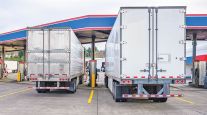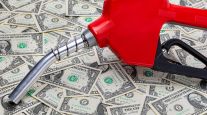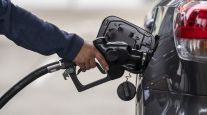Senator Urges Fuel-Tax Hike to Pay for Transport Spending
This story appears in the May 19 print edition of Transport Topics.
WASHINGTON — Sen. Tom Carper (D-Del.) said Congress should approve modest increases to the federal fuel taxes as a way to finance the six-year transportation reauthorization bill and raise revenue for the Highway Trust Fund, which is quickly running out of money.
“Don’t do it overnight, but for the next, maybe, four years, raise the gas tax,” Carper said here at American Trucking Associations’ Capitol Hill office May 13 during Infrastructure Week. “We’re all going to pay for it, but we have to figure out a smart way to pay for it.”
Carper is chairman of the Senate Environment and Public Works Transportation and Infrastructure subcommittee. For several weeks, he’s been addressing industry groups and colleagues to promote an increase of 3 to 4 cents annually in fuel taxes to “restore the purchasing power.” He also said the taxes should be indexed to inflation.
The 24.4-cents-a-gallon tax on diesel and 18.4-cents-a-gallon tax on gasoline have not been raised since 1993. Carper noted that the cost for asphalt and other building materials has increased since then.
The senator said his objective is to garner consensus in the Senate, as well as with his House counterparts, to agree on a long-term funding option that would cover the trust fund’s road and transit programs for several years.
That could be accomplished, he added, by establishing a consortium of funding systems. It would include a higher tax on diesel and gas, more tolls, a vehicle-miles-traveled fee for road users and utilizing infrastructure banks that are backed with money from businesses.
Carper made his comments after a panel of trucking industry leaders said an increase in federal fuel taxes is the most efficient way to raise money to resolve the nation’s infrastructure crisis.
ATA President Bill Graves; Chairman Philip Byrd Sr., who also is CEO of Bulldog Hiway Express; Bill Logue, president of the FedEx Freight division of FedEx Corp.; and Pat Thomas, ATA second vice chairman and vice president of public affairs at UPS Inc., opposed increased tolling of existing interstates, saying it would amount to double taxation.
Analysts have said the idea of raising federal fuel taxes is not expected to spark overwhelming support with Congress or the White House.
Meanwhile, the highway bill the EPW committee passed included a section requiring the Transportation Department and states to research financing options, which, Carper explained, would allow states to try out ideas that might work best for them.
“We cannot wait much longer,” he said shortly after EPW’s passage of the bill. “Our states and cities are counting on us to get the job done. If we choose not to address the funding shortfall with a long-term solution, we will be undermining the ability of our states to do new multiyear projects that are important to local economies and private-sector businesses.”
Carper also sits on the Senate Finance Committee, a panel that is tasked with approving a way to bolster the trust fund prior to going insolvent. It is likely the committee will act on a short-term boost while lawmakers devise a way to pay for highway programs in the long term, he added.
The fund relies on revenue from the fuel tax, but improved fuel efficiency of cars and trucks has reduced the amount of money that goes into it. In December, Rep. Earl Blumenauer (D-Ore.), a member of the House Budget Committee, offered legislation aimed at raising the tax from 18.4 cents per gallon to 33.3 cents per gallon by 2016, then indexing it to inflation. His legislation does not have broad support.




